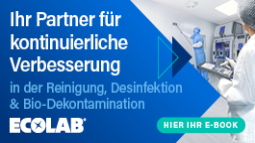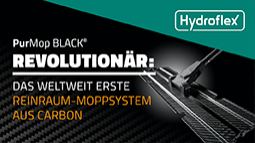- Trade fair
PFAS analysis: Reliably detecting eternity chemicals
– Planned ban on PFAS requires wide range of analysis methods
– New devices, reference materials & co. for product control
– analytica conference: PFAS in the focus of science
Perfluorinated and polyfluorinated alkyl substances (PFAS) are colloquially known as “eternity chemicals” due to their persistence in the environment. PFAS do not occur naturally, but they can be found in all sorts of things from food packaging and outdoor textiles to seals and hoses. This group of substances, which comprises over 10,000 compounds and is generally considered harmful to health, could soon be banned throughout the EU. The European Chemicals Agency is currently preparing a comprehensive regulation. When it comes into force, a number of products will have to be tested for PFAS before being put on the market. It is therefore hardly surprising that the further development of PFAS analysis is in full swing and is one of the biggest talking points at analytica 2024.
New instruments for PFAS analysis
At analytica, all major manufacturers of devices for PFAS analysis will be present, including Agilent, Analytik Jena, Bruker, Gerstel, PerkinElmer, Shimadzu, Thermo Fisher and Waters. Conventional PFAS detection is based on the coupling of liquid chromatography (LC) and mass spectrometry (MS). For highly volatile, small PFAS, however, gas chromatography with MS detection is more suitable. Alternatively, nuclear magnetic resonance (NMR) spectroscopy and fluorine-specific detection, for example via Inductively Coupled Plasma (ICP)-MS, can be used. In view of the diversity of the substance group, which includes small gaseous substances as well as fluoropolymers, and the numerous products whose PFAS content must be monitored, various analysis techniques are required. analytica will provide information on the entire range of methods. Visitors can also look forward to new devices that help screen for thousands of unknown PFAS and reduce both the detection limit and the required sample quantity.
Certified reference materials and analytical standards guarantee the reliability of PFAS analysis. The Joint Research Center of the European Commission and suppliers such as Campro Scientific, CPAchem, Labmix 24, LGC Standards and Romil will be providing information on this at analytica. PFAS are difficult analytes because they adhere strongly to the walls of sample containers and other surfaces, making them difficult to detect. Isotope-labelled standards can be used to detect such effects and determine their recovery.
The challenge of high blank values
The biggest problem with PFAS analysis is the high blank values, as solvents and other consumables often contain traces of PFAS due to the production process. In addition, laboratory plastic articles and components of analyzers are often made of the fluoroplastic polytetrafluoroethylene (PTFE), which also leads to PFAS contamination and thus to high blank values. Some device manufacturers offer “PFAS-free kits” for LC/MS to replace tubes and other components which contain PFAS. Delay columns are also available for LC so that contaminants from the analysis system have a different retention time than the actual analytes.
The analytica conference is dedicated to the PFAS issue as well, for example on April 9 at 11 a.m. in the session “Novel threats to food safety”. On April 10 at 2 p.m. in the session “Tracking anthropogenic emissions”, there will be an update from Brussels on the status of the planned regulation and the challenges of PFAS analysis. The Bunsen-Kirchhoff Award session on April 11 will focus on the detection of PFAS as a sum parameter. The analytica conference will take place at the ICM – International Congress Center Munich, near the exhibition halls, and is free of charge for all analytica visitors.
At analytica, the topic will also be addressed in the Forum Laboratory & Analysis. Here, exhibitors will present specific analysis methods for PFAS chemicals, for example in the presentation “Advanced techniques for PFAS analysis with LC/MS” by Agilent.
The combination of international trade fair and scientific conference offers contract laboratories, production plants and quality controllers from a wide range of industries the ideal opportunity to prepare for an EU-wide ban on the entire PFAS substance group.
Messe München GmbH
81823 München
Germany









